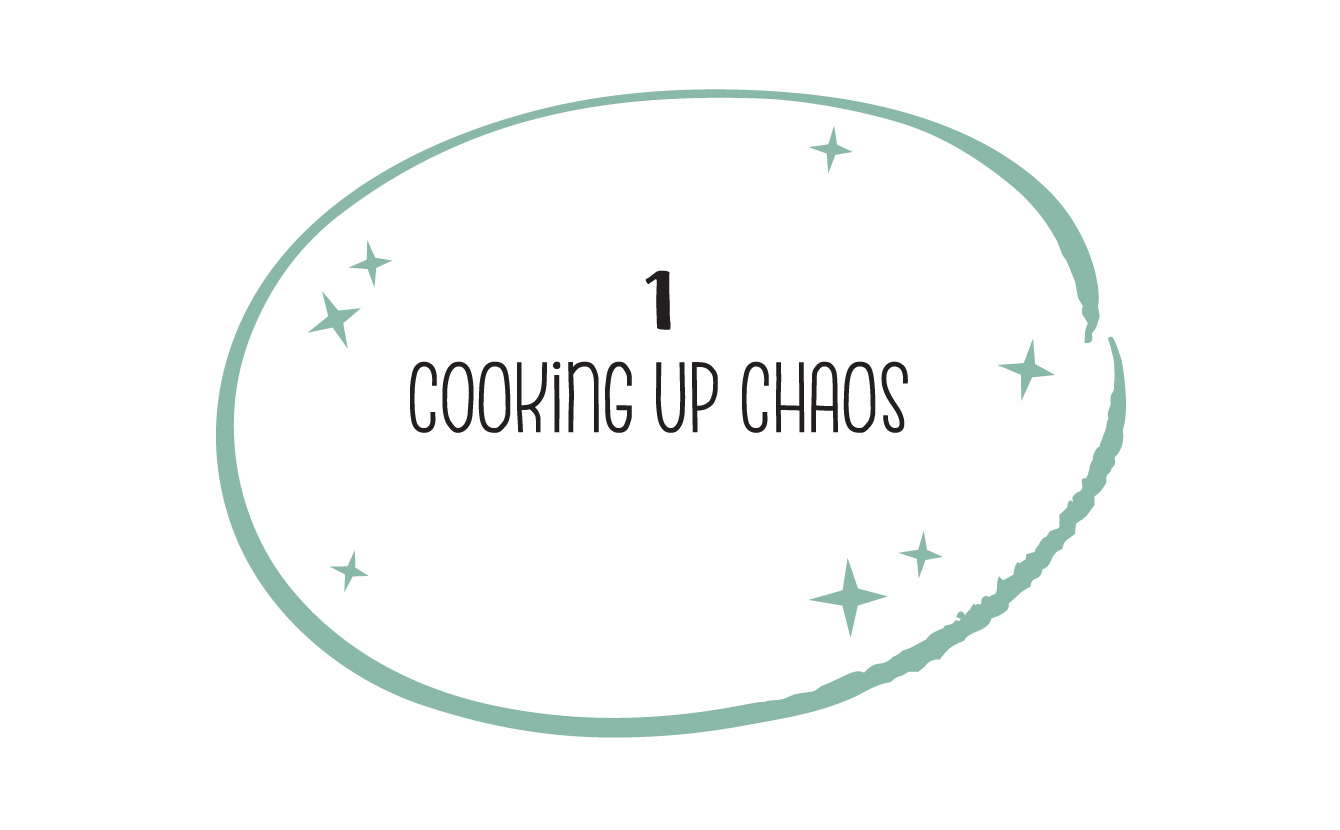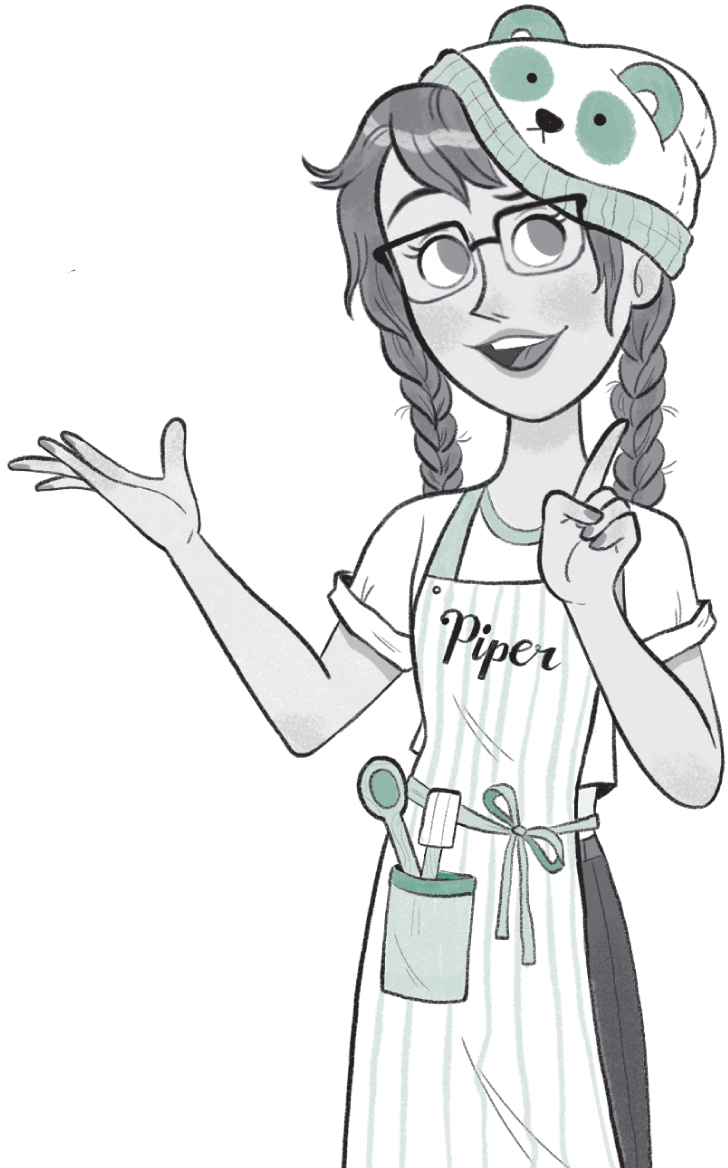
Piper Andelman’s experiment was going exactly as planned…until the smoke alarm went off.
Beeeeeeep!
Beeeeeeep!
Beeeeeeep!
Piper pressed oven mitts over her ears, trying to block out the awful sound. “Nothing to worry about!” she hollered, even though her family probably couldn’t hear her over the loud beeping. “Just a little smoke, but I’ll have it cleared out in a sec.”
Moving quickly, Piper slid a charred, smoking beaker away from the heat. She was turning off her hot plate when her dad, Jeremy, raced into the kitchen. He glanced around, grabbed a rolled-up newspaper off the counter, and fanned it under the wailing smoke detector. Piper flung open a window and waited for the smoke to clear.
In the midst of all the excitement, Piper’s little sister, Finley, bounced around the kitchen, trying to capture everything on video with their dad’s phone.
Piper’s dad dropped the newspaper as soon as the smoke alarm stopped screaming. The silence was a welcome relief. “Things going well in here?” he asked in an even voice.
“All good,” Piper said. She stood in front of her makeshift lab, holding her arms out wide to try to hide the chaos on the counter. Science was messy, but sometimes it was hard for parents to understand that. Especially when science took over the kitchen right before dinnertime.
Piper’s dad peered around her, raising his eyebrows when he spotted the scorched beaker and a countertop covered in sticky blue blobs. Nestled among the blobs was a mixing bowl filled with rising bread dough. A roasting pan full of chopped carrots, potatoes, and fresh herbs was prepared to go into the oven.
“It’s all good. Really,” Piper repeated with a smile. She sighed and added, “Dinner will be ready as soon as Mom gets home from work. I just got bored while I was waiting for the bread dough to rise, so I decided to play around a little bit. I’m testing how temperature and cooking time impact the texture of hard candy.”

“Uh-huh,” her dad said, folding his arms over his chest. “And what did you discover?”
Piper glanced at the still-smoldering beaker and shrugged. “I formed my hypothesis and have started conducting tests to see if I’m right. But I can’t share the results, since I haven’t finished my experiment. A true scientist doesn’t trust a hunch, Dad. You know I’ve gotta prove it first.”
Finley climbed onto the counter, balancing on all fours like a cat. She plucked one of the blue blobs and popped it into her mouth. The feisty six-year-old smacked her lips together as she sucked on the slightly chewy candy.
“Meow is helping,” Finley told their dad. “Meow is the taste tester and the camera lady! Meow!” Finley was going through an animal phase. For the past week, she had been starting and finishing most of her sentences with a loud meow. Piper had decided this was an improvement over her sheep phase, when she would only say “Baaaa.”
“I see,” their dad said, a smile pulling at the corners of his mouth. With a nod at the counter, he said, “Thanks for cooking tonight.” He raked a hand through his short brown hair. His checkered shirt was misbuttoned, and his glasses were smudged with fingerprints.
Piper glanced at her own messy outfit through equally smudged glasses. There were sugary stains all over her apron, and she could feel her floppy knit panda hat sliding off one side of her head. It was no wonder people said she reminded them of her dad.
“Have you both finished your homework?” Dad asked.
Piper took a deep breath but didn’t answer. In Finley’s kindergarten world, homework was a daily coloring sheet or alphabet worksheet. Fun and games, mostly. In fifth grade, homework was the pits.
When Piper wasn’t using math for science experiments or measuring recipes, she found it a total chore—and a bore. Worksheets took the fun out of math, and the word problems they had been working on for the past month were all so ridiculous. The questions never related to real-world problems, and the answers never made sense if you really thought about them. Piper had tried to point this out, but her teacher, Mr. Mohan, didn’t seem to want to hear it. The worst part was, it was extra hard for Piper to follow the math when there was so much reading involved.
Reading and writing had always been a challenge for Piper, because of her dyslexia. Math seemed to take her a little longer than most people, as a result of how her mind worked. Even still, she’d never had too much trouble keeping up in math class before. But because of all the word problems they had been doing lately, Piper had started to seriously fall behind in math. And it seemed that the further behind she fell, the harder her assignments and quizzes had gotten. Since her homework was never easy or fun, she could come up with a million other things she would rather be doing.
“I’ll do my homework after dinner,” Piper promised. “You know I need a brain break after school.”
“Okay,” her dad said, nodding. “I’ll be in my office if you need me. This deadline is killing me.” He strolled out of the kitchen, trusting that Piper would clean up after herself. She always did. Well, usually. Or maybe it was more like sometimes. But she’d noticed that her dad seemed extra stressed out about work recently, so she would definitely clean up today. She wanted to stay on his good side.
Piper’s dad worked from home as a graphic designer, so his “office” was just a desk in the corner of the living room. Whenever he was working on a big project, Piper offered to make the family dinner. She loved to cook, so this was one of her favorite ways to help out. Piper wasn’t the smartest or most athletic Andelman (that title went to her older brother, Dan), nor was she the cutest or funniest (Finley), so Piper worked hard to try to impress her parents in other ways.
Even though making family dinners was never as exciting as any of her other food-science experiments, Piper knew that every chance she got to fool around in the kitchen was an opportunity to learn something new. She considered herself part scientist, part chef. To Piper, the words “kitchen” and “lab” meant the same thing. After all, cooking was its own kind of science.
When Piper was baking or boiling something, she knew it was important to use the right ingredients, the correct amounts, the right temperatures, and the proper amount of time—just like any other kind of science experiment. If she got the mix wrong, dinner would be a bust…or blow up. (Dinner had only blown up once, and it was a very messy lesson learned!)
As soon as their dad had returned to the living room, Piper grabbed the phone out of her sister’s sticky hands. “Let’s see what you got,” she said, hitting play on the video. Both girls giggled as they watched the footage of Piper’s candy experiment. The smoke alarm was a nice touch. It gave the video some extra character.
Piper wasn’t at all bothered by the fact that her experiment had gone up in smoke. In fact, she was pleased. Mistakes—in both science and cooking—taught you something, and often led to unexpected discoveries. Food science was all about testing things and adjusting to find the right mix for your experiment. You could get different results every time and it was no big deal…unlike math, where making mistakes just led to a wrong answer.
“Do you think you have enough for your audition video meow?” Finley asked, popping a slice of carrot into her mouth. She made a face as she pulled a sprig of rosemary out of her mouth. “Icky prickly herbs,” she said, spitting the carrot into the sink.
“Yeah,” Piper said, nodding. “I should have more than enough. Thanks for helping, Fin.” She washed her hands and pushed the rest of her equipment to the side while she finished preparing dinner. As she formed balls of dough into dinner rolls, she thought about how she would put her video together.
For the past few weeks, Piper had been working on an audition video for her favorite television cooking competition, The Future of Food. The TV show was touring around the country, searching for the most inventive kid cooks in America. Piper was thrilled when she found out they would be filming an upcoming episode in a nearby town. She had always wanted a chance to try out for the show!
The Future of Food was different from most cooking shows, because kids were expected to use creativity and innovation in the kitchen, instead of just cooking big, fancy meals in a traditional way. Each week, the show had a different theme. Sometimes, contestants were asked to cook or bake using unusual cutting-edge gadgets. Other times, the host of the show introduced a crazy, out-there theme. Once, The Future of Food contestants had to cook without using any electronic tools at all. Another time, contestants were told that they lived in a future that only had potatoes and cows—so they could only use potato, dairy, and beef products in their dishes. One of Piper’s favorite episodes required contestants to cook in a space suit, using only freeze-dried astronaut food.
Each week, three lucky and talented kid cooks were invited to compete in The Future of Food’s kitchen. The winner earned a $10,000 cash prize!
Being on a show like The Future of Food was one of Piper’s big dreams, and she had every intention of making it come true. But even more importantly, she intended to win. Then she could finally prove to her family that she was the best at something, too.